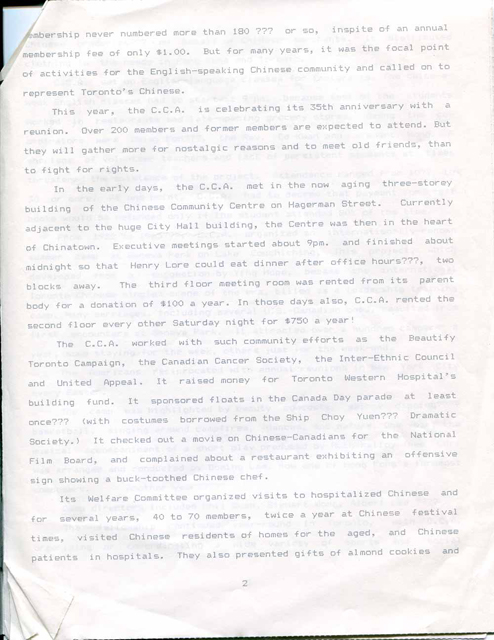Lor Malloy, Ruth
Ruth Lor Malloy was born in 1932 in Brockville, Ontario. She moved to Toronto, Ontario as a young woman to attend the University of Toronto, where she studied sociology and philosophy. She joined several clubs, including the Student Christian Movement and the Chinese Canadian Association. After graduating from university in 1954, Ruth participated in a work camp in Washington, D.C, where she learned about non-violent solutions to racial discrimination. That same year, she became involved with the Canadian Congress of Labour’s project to test Ontario’s Fair Accommodations Practices Act. Along with other labour activists, she tested a business in racially segregated Dresden, Ontario, which thrust her into local headlines. In her youth, Ruth converted to the Quaker faith and throughout the 1950s, she volunteered for several Quaker, World Council of Churches, and Canadian Council of Churches work camps that took her to Mexico, Brazil, Japan, and the Canadian Arctic. She met fellow writer Mike Malloy in New Delhi, India and the two married in Hong Kong in 1965. After traveling to China in 1965, and then again in 1972, she wrote the first English-language travel guide for visitors of Chinese heritage, which was updated in thirteen subsequent editions for all foreign visitors. While living in several places around the world, including Southeast Asia and the United States, Ruth has maintained a career as a freelance writer and photo-journalist. At the time of the interview, she resided in Toronto, Ontario and collected and preserved Asian textiles.
Ruth Lor Malloy authored this draft essay on the history of the Chinese Canadian Association (CCA) for its 35th anniversary celebrations. She traces the group’s early beginnings, its founders, campaigns to change immigration policy, social functions, fundraising initiatives, and other activities over the years since the organization’s formation in Toronto, Ontario in the 1950s.


 2 sur 9
2 sur 9 

